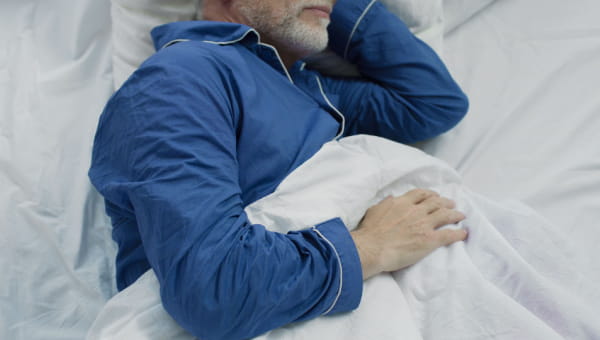Healthy Sleep, Healthy Aging
Sleep is important to your overall health, especially as you age. Read more from a BayCare sleep expert to answer your most requested health and wellness questions about sleep.
Marietta B. is the System Manager for Sleep Disorders at BayCare Health System. She has over 30 years of experience and previously worked at Baylor College of Medicine Sleep Centers in Houston, TX for 25 years before moving to Florida. Marietta holds many esteemed accomplishments, one of many being the first African American female to serve on the American Association of Sleep Technologists (AAST) Board of Directors and chaired the AAST’s Education Committee. She’s also been called upon to lecture about Sleep Health worldwide. When asked what part of Sleep Health and Education she is most passionate about, Marietta stated, “mentoring team members and introducing the history of sleep medicine and sleep technology to them.”
You can read the interview with Marietta B., BA, RPSGT, CCSH, FAAST, FAASM below.
Is losing sleep a common part of aging?
Yes. With age, sleep becomes lighter and eventually, the deep stage of sleep (stage N3) substantially decreases and in some cases, completely disappears. When an elderly person says, “I can wake up at the drop of a pin”, they are being truthful because sleep quality and sleep quantity decreases. There are numerous theories about why older adults sleep less, but it may be related to a decline in activity and therefore needing less sleep.
What are the most common sleep issues with seniors?
Insomnia is the number one complaint in seniors; however, you can’t get a sleep study for insomnia. Most of the time, they have trouble falling asleep and staying asleep, and waking up early. This poor sleep quality leads to daytime issues of falling asleep or feeling drowsy while driving, difficulty concentrating and increased irritability. Seniors often rely on sleeping pills to help improve sleep quality.
How do diet and lifestyle affect sleep patterns?
Having heavy meals, spicy meals, and/or drinking alcohol negatively impacts sleep quality. People should allow adequate time for food to digest before going to bed, so you may want to eat two to three hours before bedtime.
Can medications negatively impact sleep?
Certain medications can cause insomnia, such as decongestants, hormones (thyroid medication, oral contraceptives) Psychotropics (anti-depressants), CNS Stimulants, anti-hypertensive medications, respiratory medications (Theophylline, Albuterol), Chemotherapy medications, and other common things like opioids, caffeine, and nicotine. A common drug used to treat Diabetes, Metformin, is associated with significant sleep disturbance.
What are some of the consequences of lack of sleep for seniors?
Many people do not realize that regular poor sleep is associated with long-term health consequences and chronic medical conditions that can shorten life expectancy. Insufficient sleep is correlated with the onset of several chronic diseases and conditions, like diabetes, cardiovascular disease, obesity, and depression. As the population ages, so do concerns and experiences with sleep problems and disorders. Along with the body and brain changes that occur with age, changes in sleep are a part of the normal aging process.
How can seniors develop a healthy sleep routine?
Following the rules for good sleep hygiene helps develop a sleep routine. Sleep hygiene assists with optimizing the sleep schedule, sets up a pre-bedtime routine, and harnesses habits to make quality sleep feel more automatic. Sleep Hygiene tips include:
- Set a Sleep Schedule: Keep a fixed sleep-wake time - even on weekends, prioritize sleep, and avoid napping.
- Develop a Nightly Routine: Consistency (routine of putting on pajamas and/or brushing teeth), wind down with soft music or a light stretch, dim the lights, unplug devices, and incorporate relaxation and meditation techniques.
- Develop Daily Healthy Habits: Regular physical activity, quit smoking, cut down on alcohol, eat dinner early, restrict in-bed activity.
- Improve the Bedroom Environment: Choose comfortable bedding, sleep in cool temperatures, drown out noise, and use calming scents such as lavender.
- Use the Five Senses to Fall Asleep:
- Touch: weighted blankets, soft sheets, swaddling.
- Taste: a light bedtime snack of appropriate foods and beverages.
- Sound: listen to relaxing music (slow beats, soft jazz, classical).
- Smell: scented oil warmer of lavender essential oil.
- Sight: visualize sleep - close eyes, sit quietly, breathe deeply, imagine a place of relaxation and peace
- Leave Stress out of the Bedroom: Take time to downshift at bedtime and turn off your thoughts with mindful meditation practices.
Does the type of bed and/or pillow impact your quality of sleep? If so, how?
A comfortable mattress and pillow help promote a pain-free sleeping surface. Bedding is also important since sheets and blankets are the first thing to touch the body and should be individualized. The sleep environment needs to be cool and comfortable with minimal noise and light.
When should seniors seek medical attention for poor sleep?
In my experience, seniors will ask medical professionals about how much sleep they need, how to sleep better and what are the signs and symptoms of a sleep disorder. If tossing and turning, waking up frequently (i.e., to use the restroom), or waking up spontaneously for no reason, medication may be needed to try to reset the circadian rhythm. Always seek guidance from your medical professional regarding your specific health care needs.
Are there any herbal remedies or OTC products that you can recommend that might assist in sleep?
Most sleep professionals will not recommend OTC products for long-term use; however, some are effective for managing short-term sleep problems. People sometimes use OTC products, like Melatonin to help with sleep. Melatonin is a naturally occurring hormone in the body that regulates sleep. If a person is experiencing chronic insomnia, they should seek guidance from their medical professional or someone who specializes in sleep disorders.
What are the top 3 tips for seniors to get a good night's sleep?
- Go to bed and get up at the same time every day.
- Limit caffeine and other wake-promoting substances.
- Put away the cell phones and tablets early to avoid exposure to bright light.
If you are concerned about your sleep, please consult with your primary care physician. They can help you determine whether a sleep evaluation may be an appropriate next step for you.






